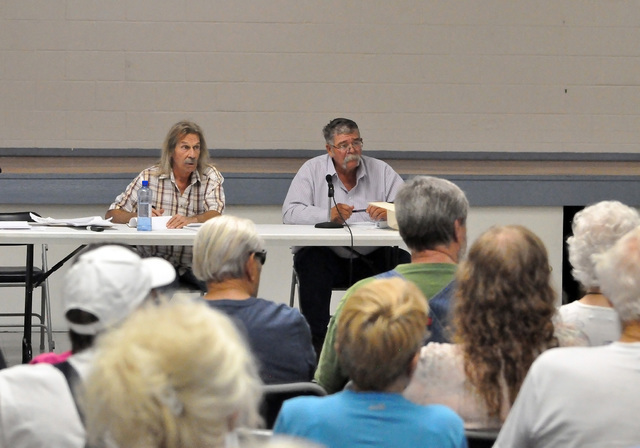
Nevada Sen. Pete Goicoechea returned to Pahrump on Tuesday to hear from domestic well owners ahead of the Legislative Commission Subcommittee to Study Water’s final session.
Goicoechea, who chairs the subcommittee, heard several suggestions on how to address the overappropriated Basin 162 that has been a concern of many domestic well owners in Pahrump.
Many at the meeting spoke about their support for a moratorium on growth in town. Some suggested taxing 60,000 acre feet of water rights and questioned why certain municipalities don’t have to prove beneficial use.
“We really need a moratorium until we figure this out,” Pahrump resident Andy Alberti said at the meeting.
Goicoechea said a moratorium on growth falls outside of the Legislature’s purview as it’s typically done by local jurisdictions, such as the county commission.
“We, as a state don’t deal with it,” he said about a moratorium on growth.
If the Legislature taxes water rights in Basin 162, it will have to do so across the state, he said.
The Pahrump Valley has close to 60,000 acre feet of paper water rights and over 11,000 existing domestic wells.
Pahrump, however, doesn’t qualify for a critical management area because its water levels aren’t declining, officials said.
“I think water conservation is the key, but again, that is something that should be dealt with on a local level,” Goicoechea said.
“The legislation we deal with is statewide, you have to understand that. You guys need to figure out, it’s 11,000 domestic wells supported or 20,000 domestic wells supported. That’s the issue in front of the people in Pahrump. At what point you no longer draw or what do you do. There is a finite amount of water in this basin,” Goicoechea said.
Fifty-eight out of 256 basins in Nevada are considered to be overappropriated. The only critical management area is Diamond Valley, located in the central part of the state.
Nevada State Engineer Jason King previously said that he supports metering of domestic wells across the state, however Goicoechea spoke against curtailment of domestic wells.
“I told you, when I started this conversation, that I did not believe the state engineer has the legal authority to curtail domestic well pumping and I will support that,” Goicoechea said.
Following the meeting, Goicoechea said that Pahrump residents brought up a lot of “good points” during the meeting.
“I’m grateful for the turnout. Some of them have merit. We will look at them and consider them,” he said about the proposals.
Taxing water rights that are held by municipalties or making them prove beneficial use was one of those points, he said.
“It boils down to the fact that existing domestic wells are not the problem,” Goicoechea said. “What we have to be concerned about is these areas that are overappropriated and could face future growth that would impact them.”
“These water issues aren’t going away. In Pahrump, it’s the domestic wells, that is an issue. But across the state, there are issues of every color. And again, this subcommittee is trying to deal with them, again what we deal with will be statewide.”
The Legislative Commission Subcommittee to Study Water held five meetings across the state to gather input on water issues before submitting Bill Draft Requests to the Nevada Legislature. One of the meetings took place in Pahrump on July 12.
The subcommittee’s final meeting will take place at 9 a.m., on Aug. 26, in Carson City.
During the meeting, members of the subcommittee will try to come up with recommendations for the Legislature for changing the water law.